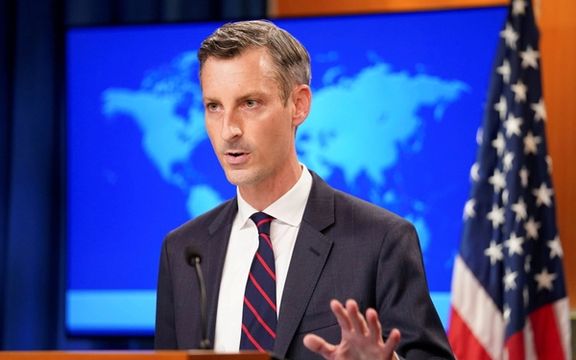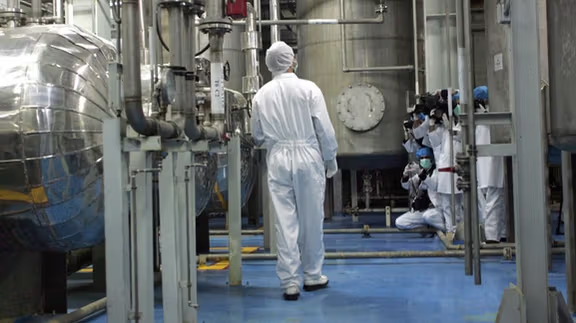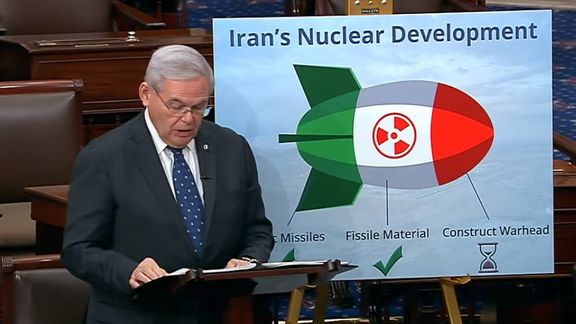Iran Security Chief Demands 'Verifiable' Lifting Of US Sanctions

Iran’s national security council secretary has echoed remarks by the foreign minister that “verifiable” lifting of sanctions by the United States is required for a nuclear agreement.

Iran’s national security council secretary has echoed remarks by the foreign minister that “verifiable” lifting of sanctions by the United States is required for a nuclear agreement.
In a tweet on Saturday, Shamkhani said, “Real, effective and verifiable economic benefit for Iran is a necessary condition for the formation of an agreement.” Earlier in the day, foreign minister Hossein Amir-Abdollahian told reporters in Tehran that Iran must have guarantees of US intentions and lifting of “some sanctions” can serve this purpose.
Shamkhani also demanded that no agreement can restrict Iran’s “right to continue research and development” in the nuclear program, which can be interpreted as a maximalist demand.
Tehran has been occasionally demanding that US should first lift sanctions to show its “goodwill”, but Washington argues that any unilateral step to remove sanctions might not reciprocated.
Talks to revive the 2015 nuclear agreement known as JCPOA took a recess in late January in what diplomats said was a critical stage for the United States and Iran to make key political decisions. US chief negotiator Rob Malley told MSNBC on Friday that the two sides have not agreed on key issues, such as which US sanctions should be lifted and what it means for Iran to return to JCPOA.
Malley said that US is willing to lift “most sanctions” imposed since former president Donald Trump withdrew from the agreement in 2018, but some were imposed for “Iran’s behavior” and are not related to the nuclear issue.

Iran’s foreign minister has said that the US reviving waivers for foreign firms acting in parts of Iran’s nuclear program “is not enough,” and it needs real guarantees.
Hossein Amir-Abdollahian noted Saturday that for talks to succeed in Vienna on restoring the 2015 Iran nuclear deal, the JCPOA (Joint Comprehensive Plan of Action), Washington still needed to guarantee it would abide by any agreement.
"In our view, goodwill in practice means that something tangible will happen on the ground. The lifting of some sanctions can, in the true sense of the word, translate into the goodwill that the Americans are talking about. What happens on paper is good, but not enough,” the Iranian foreign minister said.
The United States administration Friday defended its decision to lift the threat of sanctions against foreign companies working on aspects of Iran’s nuclear program. This followed a barrage of criticism from opponents of the Biden administration’s efforts to restore the JCPOA, who portrayed the move as a concession to Iran.
The waivers, which the US restored Friday, were withdrawn by President Donald Trump in 2019 and 2020. They had been in place for one or two years after Trump in 2018 withdrew the US from the JCPOA.
The waivers allowed continuing work to constrain Iran’s nuclear program as agreed under the JCPOA. The Chinese undertook modifications on the Arak reactor designed to preclude a route to a plutonium-based bomb, while Russian was involved in removing of supplying uranium fuel, including for the Bushehr power plant and the Tehran Research Reactor.
In a notice to Congress announcing the restoration of the waivers, the State Department explained that the move was “designed to serve US non-proliferation and nuclear safety interests and constrain Iran’s nuclear activities.”
The State Department said the move could help “facilitate discussions that would help to close a deal on a mutual return to full implementation of the JCPOA and lay the groundwork for Iran’s return to performance of its JCPOA commitments.”
Any agreement reached in Vienna would require a plan for Iran to reduce current stockpiles of enriched uranium, which might well be shipped out by Russia as was done after the JCPOA was agreed in 2015.
A state department official, speaking anonymously, told Reuters the waivers were needed for what the agency cited as “technical discussions central to the talks.”
Implementation Discussions
Similarly, Eurasia Group analyst Henry Rome told Reuters they waivers were “less a goodwill gesture or a concession to Iran, but rather technical steps that are probably aimed at ensuring implementation discussions can go forward in Vienna.”
Both State Department spokesman Ned Price and the State Department statement stressed that restoring waivers did not imply agreement had been reached in Vienna, nor that the US would lift ‘maximum pressure’ sanctions before Iran again accepted JCPOA limits.
The statement stressed that the waivers should not be seen as “a commitment or as part of a quid pro quo.”
Price tweeted Friday that the US would not provide sanctions relief to Tehran before it returns to its commitments under 2015 nuclear deal. "We did precisely what the last Administration did: Permit our international partners to address growing nuclear non-proliferation and safety risks in Iran," Price wrote.
Talks in Vienna between Iran and world powers to restore the JCPOA – with the US taking part indirectly - are expected to resume soon. The eighth round of talks broke last week as negotiators returned to their capitals for consultations.

The Biden Administration was quick to defend sanctions waivers for Iran’s nuclear program on Friday, after the move was perceived as a concession to Tehran.
State Department spokesperson Ned Price said the waiver was not a sanctions relief and emphasized that the US will not provide sanctions relief to Tehran before it returns to its commitments under 2015 nuclear deal.
"We did not provide sanctions relief for Iran and will not until/unless Tehran returns to its commitments under the JCPOA," the US State Department spokesman tweeted Friday after President Joe Biden's administration restored sanctions waivers for Iran to allow international nuclear cooperation projects.
Critics of the Biden Administration’s strategy to negotiate a restoration of the 2015 nuclear agreement with Iran were quick to criticize the moveas a concession to Iran, which might have prompted Price’s tweet.
Congressional pressure has been increasing on the Biden Administration to explain its Iran strategy, while the Vienna talks have dragged on for 10 months without a result and Iran has continued to expand its nuclear program.
The waivers allowed Russian, Chinese and European companies to continue cooperating with Tehran's non-proliferation projects including electricity generation at Bushehr nuclear power plant, Arak heavy water production facilities, and the Tehran Research Reactor. The Trump administration which pulled out of the JCPOA in May 2018 rescinded the waivers in 2019 and 2020 as part of his "maximum pressure" campaign.
Iranian officials have not commented on the Biden administration's move but Secretary of Iran's Supreme National Security Council (SNSC) in a ," tweet Saturday said no agreement can restrict "Iran's legal right to continue research and development" and "to maintain its peaceful nuclear capabilities and achievements" in an apparent reference to the Biden administration's restoration of the waivers.
After a meeting on Wednesday with Iran's top negotiator, Ali Bagheri-Kani, the spokesman of the Iranian parliament's National Security and Foreign Policy Committee, Mahmoud Abbaszadeh-Meshkini, said Bagheri-Kani had said the talks were moving in a positive direction but there were important issues that had to be resolved. According to Abbaszadeh-Meshkini, in his meeting with lawmakers Bagheri-Kani denied any direct talks with the US.
“The waiver with respect to these activities is designed to facilitate discussions that would help to close a deal on a mutual return to full implementation of the JCPOA and lay the groundwork for Iran’s return to performance of its JCPOA commitments,” the State Department said in a notice to Congress that announced the move.
“It is also designed to serve US non-proliferation and nuclear safety interests and constrain Iran’s nuclear activities,” the State Department said. “It is being issued as a matter of policy discretion with these objectives in mind, and not pursuant to a commitment or as part of a quid pro quo. We are focused on working with partners and allies to counter the full range of threats that Iran poses.”
The next round of indirect talks between Iran and the US in Vienna to restore the deal, Joint Comprehensive Plan of Action (JCPOA), are expected to resume soon. The eight round of talks broke last week and negotiators returned to their capitals for consultations.
"We did precisely what the last Administration did: Permit our international partners to address growing nuclear non-proliferation and safety risks in Iran," Price said in his tweet in response to critics who say the Biden administration is desperate to make a deal while Tehran continues to rule out any concessions.
The waiver was needed to allow for technical discussions that were key to the talks about a return to the deal, a senior State Department official told Reuters on condition of anonymity. The official added that restoring the waiver was not a signal that the United States was on the verge of reaching an understanding to return to the deal.
"The waivers are less a goodwill gesture or a concession to Iran, but rather technical steps that are probably aimed at ensuring implementation discussions can go forward in Vienna," Eurasia Group analyst Henry Rome told Reuters.

Reviving the 2015 nuclear deal would see Iran closer than a year to holding enough fuel for a bomb, United States officials have told the Wall Street Journal.
This is a shorter time-frame than the 12-month calculation underpinning the 2015 agreement, the JCPOA (Joint Comprehensive Plan of Action), which Iran and world powers are negotiating in Vienna to restore.
The Wall Street Journal Thursday cited US officials saying they had reached this conclusion late last year but still considered the JCPOA worth reviving. ‘Break out’ is seen as the time required for the US to both detect a possible Iranian bomb program and take counter-measures.
The12-month period, while not cited in the JCPOA, was based on the amount of enriched uranium held by Iran under the agreement, and the number and nature of centrifuges – the key device – available or in use. Before the 2015 agreement, the time was under a year.
The JCPOA set limits on the amount of uranium Iran could stockpile and limited the degree of enrichment to 3.67 percent, well below the 90 percent of ‘weapons grade.’
While there would be little ambiguity over Iran returning to these limits, Iranian negotiators may be arguing in Vienna that it is impractical to limit centrifuges to the less advanced ones allowed by the JCPOA, especially as some have been reportedly destroyed by attacks on nuclear sites widely attributed to Israel.
But the biggest challenge in calculating ‘break out’ – and which may explain the latest assessment of a restored JCPOA – is factoring in the value of experience and knowledge gained by Iranian scientists in the expansion and improvement of the program since 2019, including in deploying more advanced centrifuges.
Increased knowledge and experience
“There’s nothing that a restored JCPOA will do to compensate for that increased knowledge and experience” Iran had gained, Robert Einhorn, a former senior State Department arms-control official, told the Wall Street Journal. Einhorn said a six-month break-out period would be enough time to respond—militarily if necessary—to an overt Iranian nuclear breakout.
A State Department spokesperson approached by the Wall Street Journal refused to comment on break-out assessments while insisting the US administration believed a restored JCPOA “would address our urgent nonproliferation concerns.”
The spokesman reiterated a message, delivered by among others Secretary of State Antony Blinken, that “we have only a few weeks to conclude an understanding, after which the pace of Iran’s nuclear advances will make return to the JCPOA impossible.”
While any break out would be shorter than the time Iran would need to assemble a deliverable device, some former US officials have suggested that a period of under six months would remove Washington’s ability to respond sudden ramp-up beyond the JCPOA.
Talks in Vienna over restoring the JCPOA, paused this week for political consultations, have struggled to agree how exactly the Iranian nuclear program be brought back within JCPOA limits and precisely which US sanctions violate the agreement.
Iran began exceeding the JCPOA in 2019, last year reaching 60 percent enrichment, after President Donald Trump left the agreement in 2018 and imposed ‘maximum pressure’ sanctions his officials said would lead Tehran to accept 12 US demands, including ending all enrichment, scrapping missile defense, and breaking regional alliances.

The US State Department has repeated its warning that the window to reach a nuclear deal with Iran is closing fast, without setting a time limit on negotiations.
State Department spokesperson Ned Price on Wednesday said the window of opportunity to restore the 2015 nuclear agreement known as JCPOA “is very, very short,” and added, “that window is very, very short precisely because once Iran reaches the point where its nuclear advances have obviated the nonproliferation benefits that the JCPOA conveyed, that’s a point at which it will no longer make sense, from our national security interests and the national security interests of our allies and partners around the world, to pursue a mutual return to compliance with the JCPOA and we’ll have to pursue another course.”
Iran began enriching uranium to a higher purity level of 20 percent when former president Donald Trump tightened US sanctions in May 2019. But it boosted enrichment to the dangerous level of 60 percent in early 2021 when President Joe Biden had announced his readiness to return to the JCPOA, abandoned by Trump in 2018.
Ned Price however, blamed the former administration for triggering Iran’s decision to enrich more uranium to a higher degree of purity. A reporter asked him if he believed Iran had a choice and decided to stockpile more fissile material and get closer to a bomb. Price insisted that the JCPOA was preventing such a move and the US withdrawal from the agreement allowed Iran to boost enrichment.
Price avoided a direct response to a question on the most recent political development in Washington, when Democratic Senator Bob Menendez gave a detailed speech on the Senate floor on February 1, questioning Biden’s policy on Iran and its nuclear program. The State Department spokesperson reiterated the administration’s concerns about Iran’s nuclear program but did not respond to the Senator’s criticism.
Following Menendez’s remarks, the Senate Foreign Relations Committee announced on Wednesday that Special Envoy for Iran Rob Malley will testify next week in a closed session, a demand by many Republicans for answers from the Administration on Iran policy.
Price’s warning about time running out has been a message constantly repeated by the Biden Administration and its European allies for months, without issuing a deadline for Iran to reach an agreement in Vienna. The enforcement of sanctions has also slackened, allowing Tehran to export more oil and claim to be in a stronger position in the talks.
China, which is one of the signatories of the JCPOA and a participant in the Vienna talks, has increased its oil imports from Iran, indirectly undercutting the West’s leverage in the negotiations. There have been reports that the US has asked China not to violate its sanctions, but apparently Beijing has pursued its own policy of expanding ties with the Islamic Republic.
Tehran has also continued its provocations in the region, with repeated militia drone and rocket attacks in Iraq and Syria against US forces. In January, Iran-backed Houthi forces in an unprecedented escalation began launching missile and drone attacks against the United Arab Emirates.
To what extent the US Congress will stay on the sidelines of policy toward Iran is not clear but Senator Menendez appeared determined to put pressure on the Administration.
“It’s time to start thinking out of the box and consider new strategies for rolling back Iran’s nuclear program and addressing its dangerous and nefarious activities,” he said on the Senate floor.

The US Senate Foreign Relations Committee has asked Special Envoy for Iran Robert Malley to testify about the ongoing Vienna negotiations to revive the 2015 nuclear deal.
The briefing session to update Senators on the Vienna negotiations is scheduled to be held on Wednesday, February 9, but the hearing won't be open to the public or televised.
The session was set only a day after Senator Bob Menendez asked President Joe Biden to stop the nuclear talks and adopt a tougher position on the Islamic Republic.
Menendez, the chairman of the committee, is the first senior Democrat to challenge Biden on its policies towards Iran, saying, “We cannot allow Iran to threaten us into a bad deal or an interim agreement that allows it to continue building its nuclear capacity”.
Menendez, who opposed the 2015 Joint Comprehensive Plan of Action (JCPOA) when it was negotiated by the Obama administration, said Biden should not stick to the framework that leaves “the vast majority of Iran’s nuclear program intact”.
Earlier in January more than 100 Republican members of Congress wrote to Biden asking him to stop the negotiations and get tough with Iran, which is fast enriching uranium to higher levels.
Iran’s enrichment picked up in early 2021, after Biden said he wants to restore the JCPOA and moved toward opening talks with Iran.